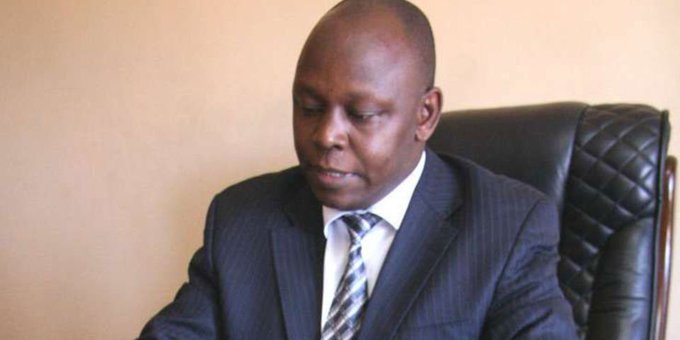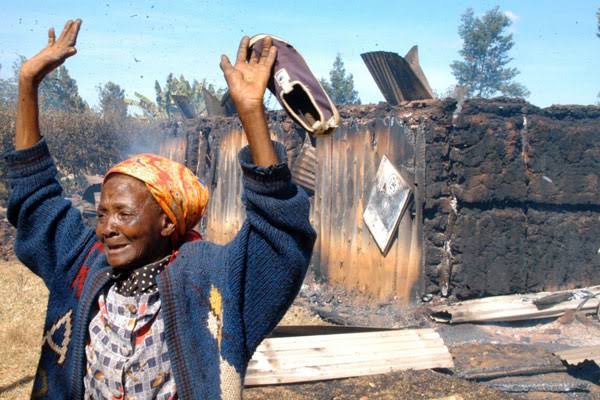A survivor of the Kiambaa church massacre is one of eight witnesses lawyer Paul Gicheru is accused of influencing to pull out of the ICC case.
At least 30 people were burnt alive in the Eldoret-based church at the height of the mayhem that followed the disputed 2007 General Election.
International Criminal Court prosecutor Fatou Bensouda said in 2013 that eight prosecution witnesses unwilling to testify in the trial of Deputy President William Ruto and former journalist Joshua Sang were insider witnesses.
This is ICC-speak for witnesses who make allegations that link an accused person to the crimes they are alleged to have committed.
Insider witnesses typically testify about meetings they attended in which an accused person allegedly participated in the planning of a crime.
In a January 9, 2013 submission to the court, Bensouda said she expected to call a total of 46 witnesses. Eight pulled out.

Bensouda, in her December 5, 2013 application, said the pull-out by the eight happened after the prosecution revealed their identities to defence lawyers between February and April 2012.
However, Bensouda did not explicitly or implicitly state that the defence teams of Ruto or Sang were involved in the withdrawal of the witnesses.
The survivor — a woman identified as Witness P- 536 — told the ICC how she saved her brother by stripping naked while the church was ablaze.
According to records of International Justice Monitor, an NGO, the witness sought refuge in the church because violent youths had burnt down many homes in nearby villages.
She recounted how hundreds of young warriors with faces daubed in white clay and their leaders wearing bandanas attacked the church.
The witness also told the ICC that she watched in horror as a woman was raped and an elderly man struck in the head with an axe.
An idea struck her to strip — a curse in Kalenjin culture — after the youth chased her brother down after shooting an arrow into his neck.
But months after her testimony, Witness 536 told the prosecution that she was approached with an offer to withdraw or recant her statement.
She is alleged to have been bribed, together with her husband, Sh1.4 million, with the court saying they could have collected the cash in Kampala between May and July 2013.
The shocking revelations have lifted the lid on what could have frustrated the prosecution’s bid to nail DP Ruto and Sang for crimes against humanity.
Charges against the duo were, however, vacated on April 5, 2015. At the time the witness is alleged to have been bribed, several other witnesses who had been lined up to testify before The Hague-based court also recanted their statements.
Among them are Witness P-397, Witness P-495, Witness P-516, Witness P-613, and Witness P-800.
But lawyer Gicheru’s surrender to the ICC earlier this month could signal a rebirth of the cases.
The lawyer presented himself to Dutch police on November 2, 2020, and denied charges of witness tampering during his first court appearance on November 6.
The ICC had issued an arrest warrant against him, journalist Walter Barasa and Philip Kipkoech Bett on charges of interfering with witnesses in the Ruto and Sang case.
Barasa’s summons was issued way before Gicheru’s but he has fought his handing over to The Hague.
Some witnesses ceased contact with the court, allegedly after they were approached, while others recanted their statements.
Ruto’s legal team exuded confidence that there would be no rebirth of the case because the charges were unfounded.

Lawyer Katwa Kigen played down Gicheru’s move as one that would neither resuscitate the prosecution case nor improve the evidence it relied upon.
Bensouda alleged that Gicheru and Bett bribed the witnesses – mostly insider or linkage persons in the trial. Ruto has at no point been directly linked to the events.
The prosecution alleged that Witness P-397 was approached by Bett – in the company of another person, and took him to meet Gicheru.
The lawyer is alleged to have negotiated a Sh5 million settlement for the fellow to withdraw as a prosecution witness.
He was paid Sh1 million on two different dates and signed an affidavit – reportedly in Eldoret – that he no longer intended to testify. He did not recant his statement, though.
For Witness P-613, the prosecution alleges she was given a job in addition to being paid to withdraw.
The arrest warrant did not state the amount that was discussed for the witness whose account ICC judge Chile Eboe-Osuji dismissed as consisting of a lot of hearsay.
Witness P-800 was allegedly approached by Bett and Barasa – on behalf of Gicheru as per the warrant – with an offer of Sh1.5 million to Sh2.5 million.
The prosecution alleged she signed an affidavit withdrawing as a prosecution witness in the office of Mitei and Company Advocates on Gicheru’s instructions.
Witness P-495 was an insider witness whom the prosecution lost touch with in September 2013 after he checked out of a hotel he had booked on the day he was to meet with the ICC team.
His identity had been revealed to the defence in March 2013. He was allegedly offered Sh2.5 million and employment to withdraw.
The witness, whom the court later declared hostile, is said to have met privately with Gicheru to discuss the terms of the agreement.
Judges at the ICC admitted his statement with prosecution investigators as evidence, a move which the defence appealed against.
- Nyeri Man In Court For Forging Birth Certificate To Inherit 2 Billion Estate Of Man Who Died Childless And Without Wife
- Trump Enticed With Book And TV Deals Worth Ksh 10 billion If Legal Battle Fails To Secure Him Victory
- How A Ruracio In Mwihoko Caused Online Storm.
- US Woman Arrested For Masturbating In Front Of A Child Outside A Supermarket Rearrested For Same Offence
Witness P-516 failed to attend a scheduled July 6, 2013 meeting with ICC prosecutors and ceased communication with the court.
It is unclear whether the man, said to be well-known in Rift Valley, was bribed or was involved in bribing someone else having received Sh100,000.
International Justice Monitor reports that the witness never informed the court he was withdrawing from the case.
The prosecution claims the man met Gicheru in Eldoret where they agreed on the terms of withdrawal, details which the court did not give.
Fourteen months later, he testified via video link from Nairobi, saying he was coached to testify and was promised a “good life” and education for his children.
Gicheru will have a busy 2021 in the Hague-based court. On February 12, the office of the prosecutor is expected to file a document containing the charges.
On February 26, his defence team is expected to respond to the charges with parties expected to conclude their statements on March 15.
The prosecution is set to respond to the defence on March 22 with the latter expected to respond to the prosecution.
RELATED POST:paul-gicheru-denies-dishing-out-moneypromising-jobs-to-witnesses-in-rutos-icc-case
